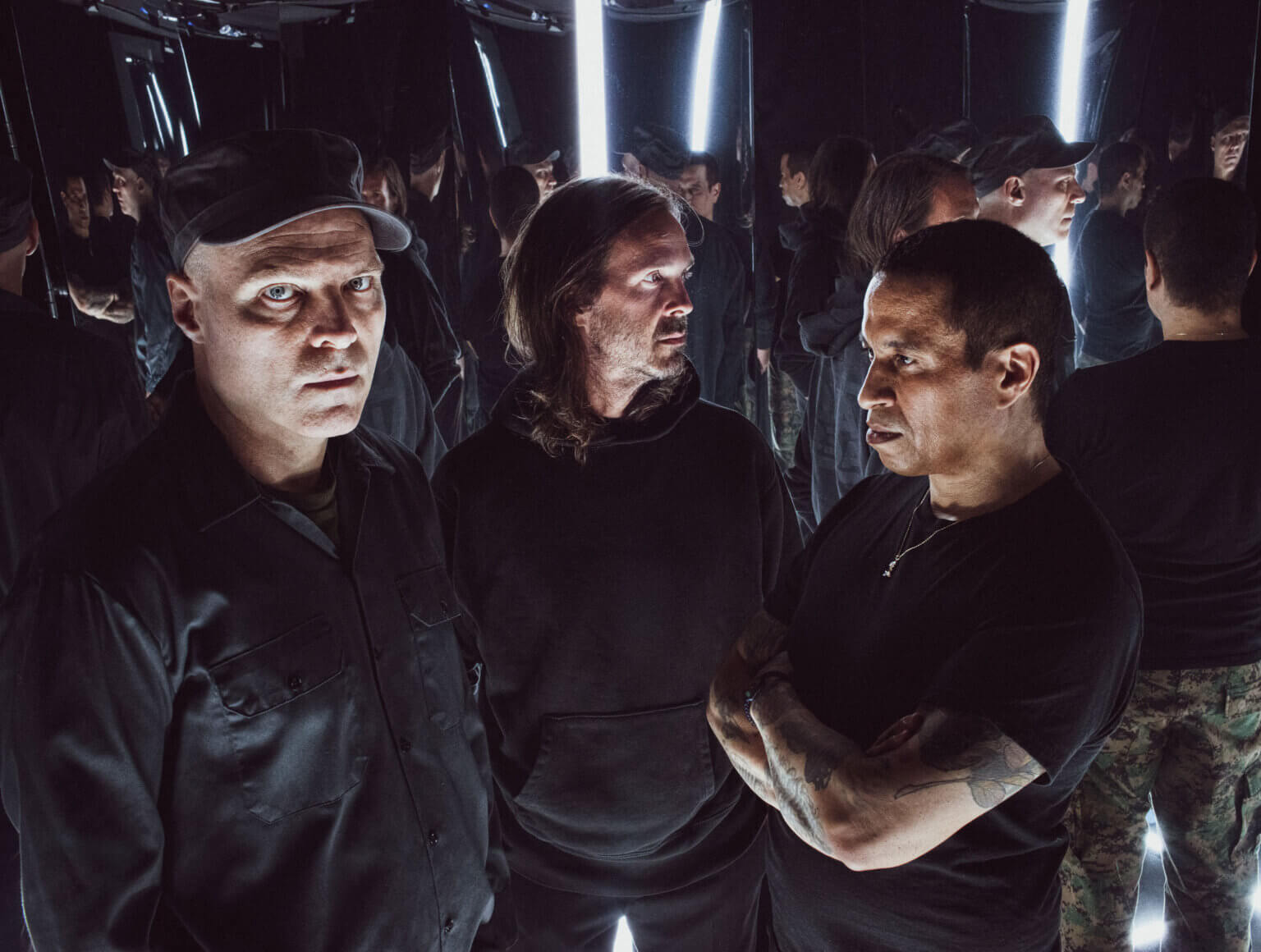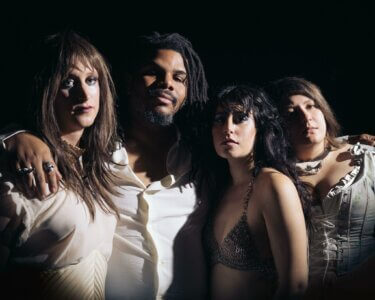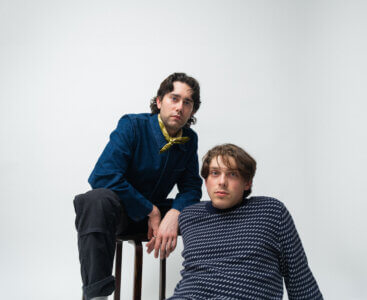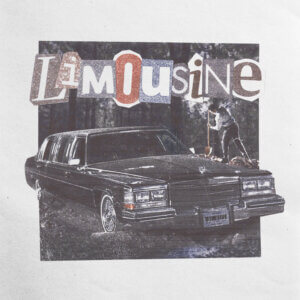Quicksand stay strong and contemporary

Quicksand was formed in New York in 1990 and released two fantastic records: Slip in 1993 and Manic Compression in 1995. They would split up that year but their legend would continue to grow. During this time the members of Quicksand would also play in bands such as Rival Schools, Walking Concert, Handsome, and Deftones. They would reunite in 2012 and release the excellent album Interiors in 2017. Now they’re gearing up to release their new album Distant Populations. It’s another great entry into their discography sure to make fans very happy once again. Jahmeel Russell had a chance to speak to frontman Walter Schreifels ahead of the album’s release.
NT: Interiors was released in 2017. When did you begin composing songs for Distant Populations?
WS: We were compiling. Anytime when we get together for a rehearsal or a soundcheck, we would record them. So we would have these jams… a lot of Quicksand stuff kind of comes from jams. So we just compiled these different little snippets. Then when it came time that we were wanting to make a record, we presented the ones we had recorded that we liked the best, and then narrowed down the ones that we were all excited to work on. Then did the work of constructing those jams into songs. Then as that developed, we kind of got a better sense of where the record would go, what we wanted, what might be missing, or what might compliment it better. So then we started to write, informed by that and present individual songs. So we’re constantly just working. I have dozens of voice memos. I’m just always recording my ideas and that’s how Quicksand is too. There are things like Missile Command that happened very spontaneously, that groove between (bassist) Sergio (Vega) and (drummer) Alan (Cage). I added this sort of air raid siren sound and it came together very spontaneously. Whereas, Sergio came in with the music for Inversion. I gave my 13-year-old nephew $20 to create a drum loop for me and then I wrote all the music to Brushed just listening to his loop. Then we developed it, Sergio added this amazing bass line. Alan added these really cool beats over the loop. So some things would just kind of come together spontaneously, but the basic starting point is jams because, within a jam, everyone’s playing exactly what they want to together.
NT: You know it’s Quicksand when you hear it but you guys have never repeated yourselves. This time out the songs seem slightly more aggressive and to the point. Do these changes just come about naturally over time or when you’re getting to work on an album do you have a plan for the direction you want the material to take?
WS: No, we were purposeful in that and I think that’s what’s really cool about this record. On Interiors, we were just trying to make something good that we liked because we really didn’t know what the fans wanted or that we could deliver on some sort of new Slip or something. You can’t really, so having created a record that we were all really psyched on, we had more confidence and more understanding. So with this record, we’re purposefully more concise than what we did on Interiors. I think we kind of even repeated the cycle of what we did on Slip. I feel like a Slip was more expansive and Manic Compression was kind of a reaction to that in some ways. So I think this is more like a crack your knuckles and let’s do this kind of record than Interiors was.
NT: I saw you guys twice in 2013 when you reunited again and you still had (guitarist) Tom (Capone) in the band. When you composed Interiors, did you record that record with the idea that he was going to be performing those songs live with you?
WS: Yeah, we wanted Tom to play with us. It was just kind of a little bit rocky unfortunately at that time, but we definitely wanted to keep him in the band. Ultimately, that didn’t work out. Tom’s awesome and the stuff that he did with our band is fantastic but we wanted to continue and work as the three of us who have great chemistry as far as writing. So Interiors was the three of us anyway. We just wanted to include Tom ultimately. This record we had already done the work. We had toured as a three-piece, and that really was a trial by fire but it also brought us a lot closer. So with this record, that wasn’t a thing for us. We felt the confidence that we could do something great and move on. Manic Compression and the things we did in the 90s give us a certain context. I love that stuff and it’s awesome but it’s important for us to feel like we are a contemporary band. To be in the conversation that’s happening now and beyond nostalgia. I think with this record that was definitely baked into it.
NT: I hear what you’re saying about the differentiation between the 90s and now because the one thing about the first two records, especially the first record, is there’s a lot of those parts in the songs where one of the guitars is pedalling on an octave or something. Then the bass and the other guitar are kind of dancing around it almost like something Fugazi would have done. That’s definitely one element that’s different on the new stuff. So when you’re writing and you know you’re going to have to perform it live, has there been any ideas where you realized it wasn’t going to work now that there’s only one guitar?
WS: Yeah, I mean, I didn’t want to tie my hands too much but that was certainly a consideration. Doing three pieces is amazing, but it’s also just so consuming because even in the writing process, I’m trying to write really cool guitar parts but I also have to write vocals which I have to be able to sing while playing the guitar. Beyond the vocals, I have to write the lyrics that are going to make sense and all that kind of stuff. So having not created the band as a three-piece, it presented new challenges, and I think you get different results with that. Whenever you challenge yourself in that way you get stronger and you develop new skill sets. So that was a consideration but I’ve kind of had it in my head that it probably wouldn’t hurt us to have a second guitar player for when we were coming back here and playing live. So we’ll see how that develops. I want to present these songs in the best absolute way so I’m really excited about getting out there and doing that. I’ve definitely evolved as a player so if something happens, I want to feature that thing and I want it to be important. It doesn’t have to be complex or anything fancy. I think between me and Sergio, there’s a lot of weaving and dynamic there naturally because Sergio is such a lyrical bass player. You could isolate his track and there’s like a whole song there that you could listen to by itself and it would be interesting.
NT: I have to agree with you 100% on that. To me, Sergio’s bass playing is really key and he’s always stood out. I just have to think about the song Fazer. That break where he’s just playing. I remember seeing that video when I was a kid and just being like, holy shit, who is this band? I literally saw that video and went out and bought the record.
Was producer Will Yip’s involvement in making this record much different than Interiors? Did he get involved at all in the arrangements of the songs?
WS: I had worked with him on another record so I had a relationship with him and I thought the other guys would really dig him. He’s a great musician, he’s an awesome producer and he just really keeps you on task. He’s fun and cool, and just open. So there was a lot of trust and he really became such an asset and like another member of the band in many ways. So when you have a producer that everyone trusts and respects, it’s cool, because sometimes you can end up where you think this parts the important part of the song and the other person doesn’t agree with you. Then you have to work that out. I mean, we’re mature enough that we can come to those solutions but it’s nice to have someone that’s a bit on the outside that everyone respects to navigate those situations more quickly and to come to other solutions. I think Will is really, really great with that. When we finished Interiors it was just so positive. We felt so great about it that we wanted to take our collaboration to the next level with this record. I’m really glad we did because I think he was very instrumental in a lot of cool choices. I just think he has great taste and he’s and he’s a great hang too.
NT: How did you end up working with Tetsunori Tawaraya on the artwork and how involved was the band in its creation?
WS: We have a lot of mutual friends, me and Tetsunori, and I’ve been a fan of his work. There’s a really cool comic book store near my house called Desert Island and I discovered his work there. So with this record, we wanted it to be a little bit more punchy and aggressive, but in such a way that has some sort of fantasy element to it. I think Tetsunori, his artwork is kind of perfect for that because it’s got a bite and this dangerous kind of environment. Like we’re monsters and lasers and all this kind of shits going on. But it’s also just beautiful and lush and kind of sparks your imagination. So it was the world that I wanted our songs to live in.
NT: You referenced My Bloody Valentine and Fugazi as influences around the time you recorded Slip. Do you still consider them influential on Quicksand’s newer material?
WS: Oh, hell yeah. I mean, those are like cornerstones. Ian MacKaye, Kevin shields, Angus Young. That’s where I’m usually bouncing between in guitar music. Especially Fugazi, you’ve Guy Picciotto as well and the interplay of the guitars. As a unit Fugazi, the four voices playing in unison just have such dynamic and musicality to it. It’s just really amazing and My Bloody Valentine just has this just deep emotional effect on anyone that hears it. I really loved it because on the one hand it was so beautiful and lush and on the other hand, it sounded like noise which was also what appealed to me about hardcore. If you dig deeper you start to catch the beauty in it, and My Bloody Valentine are just incredible with creating these kinds of soundscapes. It’s not like I’m onto some shit that people don’t know about. I would say Fugazi and My Bloody Valentine are pretty well-cited as influences on a lot of guitar music, but I guess when I got into them I saw Fugazi for a can of soup in 1987 or something, whenever they first started. My Bloody Valentine, I was into them when Isn’t Anything came out. So I was just lucky to be alive and paying attention at that time.
NT: Do you think your work with Rival Schools, Walking Concert, or Dead Heavens has had any impact on your compositions for Quicksand?
WS: For sure, I think definitely Rival Schools is kind of Quicksand with a bit more of a melodic side to it. I think you might hear as far as my part in it, that kind of informs songs like Brushed or Phase 90. Walking Concert I got really into the lyrics and song structures. To me, it’s kind of my best songs and I think it definitely informs all my work since. Playing heavy music and psychedelic music, Dead Heavens was huge for me and I think that if you listen to Dead Heavens, Interiors, and Vanishing Life too, you can hear how they all correspond to each other. To me, Vanishing Life was plugging into this heavier post-punk sound. How do I interpret heavy music or aggression into Quicksand at this point, because I was sort of out of practice with heavy music and same with Dead Heavens. Dead Heavens is kind of touching on Cream, Disraeli Gears or proto-metal like Damnation of Adam Blessing, Can, sort of Kraut, kind of expansive sections, and that all came to play in Interiors. So each thing that I do informs the next, and the people that I play with influenced me and kind of give me a new perspective on things. So it’s really important to me, and I feel very lucky and blessed to be playing with all these really interesting, cool people and making different sounds and carrying it forward into the other things. Quicksand definitely benefits from that and playing with Sergio and Alan in Quicksand is just awesome. So one thing kind of informs the next in a lot of ways.
NT: What are the band’s plans for the rest of 2021? I know you have a tour coming up in the fall.
WS: Yeah, that’s the main thing. We just did a live performance yesterday and that’s going to be coming soon. That was really exciting. It came out so good. I’m really excited to play live in the fall and through 2022 as things open up. I’m hoping that all goes according to plan. I’m excited to get out there and hang with my friends and travel, and really excited to play these new songs because they just sound super, super strong and relevant. Playing them, and even playing them with the old material. It’s just a good feeling.
Pre-order Distant Populations HERE
Latest Reviews
Tracks
Advertisement
Looking for something new to listen to?
Sign up to our all-new newsletter for top-notch reviews, news, videos and playlists.









